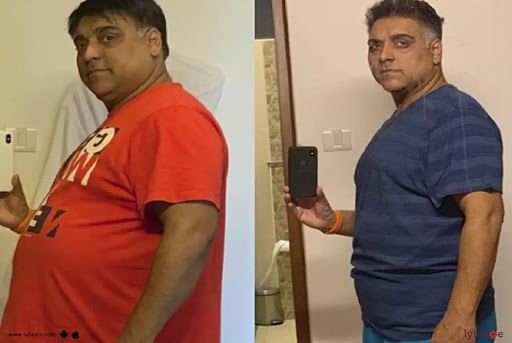Television Actor Ram Kapoor's Shocking Weight Loss Transformation!
Actor Ram Kapoor recently took the internet by storm, after he posted recent pictures of his extreme weight loss transformation. His journey from ‘fat to fit’ has left his fans stunned, and inspired many to strive towards a healthier lifestyle.
Reportedly, the Bade Achhe Lagte Ho actor, who previously weighed 130 Kgs, turned to intermittent fasting and intense workouts to shed the extra kilos. The 45-year old actor revealed that it took him 2 years to achieve his goal.
The method he employed was intermittent fasting with regular workouts. Let’s take a look at his diet and exercise regime.
Workout Regime -
To start with, the actor directly hits the gym every morning on an empty stomach and does heavy weight training. At night, just before going to bed, he makes sure he engages in some intense cardio workout to sweat it out.
Fitness experts suggest that a combination of cardiovascular exercise and weight training work best for weight loss. While cardio exercises like running, jogging, and cycling helps burn calories, heavy weight training helps build muscles and gives you a fitter, toned look.
Diet Plan -
The actor stuck to intermittent fasting to go from fat to fit. For those, who are not familiar with the term, Intermittent Fasting is a diet plan, which cycles between periods of eating and fasting over a defined period. It does not specify the kinds of food one should eat, but rather when one should eat. The 16/8 intermittent fasting method involves eating during an 8-hour window and fasting for the remaining 16 hours over a period of 24 hours.
Regardless of the time of consuming food, it is advised that you consume light snacks and small meals several times, spaced evenly throughout the day. Try to balance each meal with a variety of nutritious foods, which includes vegetables, fruits, whole grains, lean proteins, and healthy fats. Remember, you are not allowed to eat anything solid during the fasting period. However, one can drink beverages like coffee, tea and water during the period. Nevertheless, keep a check on the calories you intake.
Pros and Cons of Intermittent Fasting -
Intermittent fasting has gained immense popularity owing to its long-term benefits on health. Here are some advantages of the diet plan –
-
Promotes weight loss – restricting calorie intake to a few hours help burn calories throughout the day, boosts metabolism and promotes weight loss
-
Improved blood glucose control – intermittent fasting lowers levels of fasting insulin by up to 31% and reduces blood glucose by 3-6%, potentially lowering your risk of diabetes
-
Enhanced longevity – this type of diet has been associated with extended longevity
Despite the many health benefits, intermittent fasting does come with a few drawbacks, including the following –
-
Limiting food intake to only 8 hours may lead some people to consume more than usual during non-fasting periods in an attempt to make up for the hours spent fasting, eventually leading to digestive problems and weight gain
-
If you are just getting started with intermittent fasting, it may take a toll on your health, causing symptoms like weakness, fatigue, and increased hunger
Therefore, consider both the pros and cons of intermittent fasting before you start off with your weight loss journey.
Precautions to Take in Intermittent Fasting -
16/8 intermittent fasting can improve your health when paired with an active, healthy lifestyle and nutritious foods. It should not be viewed as a substitute for a well-rounded, balanced diet. Here are a few precautionary measures to take while turning to this type of diet pattern –
-
Shorten your fasting periods
-
Eat in small quantities on days when you are fasting
-
Stay hydrated
-
Meditate or go for short walks
-
Do not break your fast with a huge meal
-
Include enough protein in your diet
-
Consume plenty of whole foods on days when you are not fasting
These tips will help you get going as you turn to intermittent fasting. In case you feel unwell, stop fasting at once and consult a doctor.
Intermittent fasting is easy to follow and sustainable and flexible in the long term. Although this type of diet is considered usually safe for most adults, you should discuss the diet plan with your doctor before trying it, especially if you have a history of an underlying medical condition.



+1.svg)
